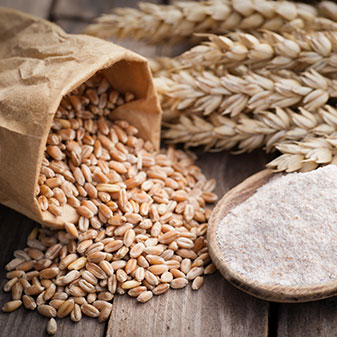Health Benefits of Whole Grains
The Health Benefits of Whole Grains
It might come as a surprise, but of the five food groups, whole grains rank just as important as vegetables. However,

most Australians consume less than half of what is recommended — at least two-thirds of the grains category (the equivalent of 4-6 servings per day).
Whole grains are seeds derived from grass-like plants called cereals. They are comprised of three parts:
- bran
- endosperm
- germ
Refined grains and enriched grains, by contrast, don't contain all three parts and therefore aren't as healthy as whole grains. Most of the nutritional value in whole grains come from vitamins B and E, iron, zinc, magnesium, and riboflavin. Whole grains are also packed with carbohydrates, protein, and fibre.
What Are the Health Benefits of Whole Grains?
Eating whole-grain foods can reduce the risk of contracting diseases like heart disease, diabetes, and colon cancer. Whole grains also benefit the digestive system and aid in the prevention of constipation, as well as reduce inflammation. High-fibre foods take longer to digest, so eating whole grains helps prevent overeating by creating a sense of fullness.
Whole grains are crushed to a finer texture than refined and enriched grains and thus retain more healthy ingredients because they include bran and germ. Whole grains are especially important for vegetarians because of the high source of iron and zinc they contain. These nutrients are often lacking in a meatless diet.
Which Whole Grains Are Healthiest?
When it comes to incorporating whole grains into your diet, you want to stick to foods that are 100% whole grain, such as:
- popcorn
- oatmeal
- quinoa
- brown rice
- wild rice
- buckwheat
- barley
It's important to always check food labels and make sure you are getting foods that are healthy whole grains, and not refined ones. Make sure packages list either whole grain or wholemeal, instead of a mixture of whole grains and refined grains.
Also, check for the amount of sugar in foods. Just because the packaging says it has whole grains doesn't automatically make it healthy. This is especially important for breakfast cereals, which often have large amounts of sugar.
Are Whole Grains For Everyone?
People with celiac disease, irritable bowel syndrome (IBS), or gluten sensitivity should not eat certain types of whole grains, as they can cause fatigue, indigestion, and joint pain, among others. Under these circumstances, whole grains to avoid are wheat, barley, and rye. Gluten-free whole grains include rice, oats, and buckwheat, which are usually tolerable for people with allergies or food intolerances.
References
Australian Guide to Healthy Eating
9 Health Benefits of Eating Wholegrains
